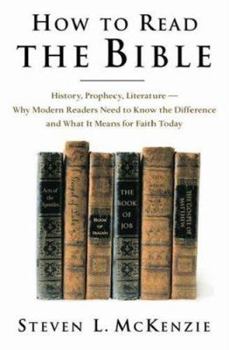How to Read the Bible: History, Prophecy, Literature--Why Modern Readers Need to Know the Difference and What It Means for Faith Today
Select Format
Select Condition 
Book Overview
McKenzie argues that to comprehend the Bible we must grasp the intentions of the biblical authors themselves--what sort of texts they thought they were writing and how they would have been understood by their intended audience. In short, we must recognize the genres to which these texts belong. McKenzie examines several genres that are typically misunderstood, offering careful readings of specific texts to show how the confusion arises, and how knowing...
Format:Hardcover
Language:English
ISBN:0195161491
ISBN13:9780195161496
Release Date:September 2005
Publisher:Oxford University Press
Length:224 Pages
Weight:1.09 lbs.
Dimensions:0.9" x 6.4" x 9.5"
Customer Reviews
2 ratings
A Scholarly Work
Published by Thriftbooks.com User , 16 years ago
The book is extremely well written, and a great introduction to reading the Bible critically and as literature. The author is a professor, not a preacher, and approaches the reading of the Bible in a contextual format. The basic types of Biblical writings are discussed, examined and examples are given. McKenzie emphasizes the need to read the Bible within the cultural, historical and literary framework at the time of writing. This approach is likely to turn off a reader who is looking for a religious rather than a critical scholarly text. I strongly recommend the book if you are looking for an approachable and readable introduction to scholarly Bible study.
Reading for context, not just words
Published by Thriftbooks.com User , 18 years ago
Throughout history there has been no shortage of ways that people have read the bible: as literal truth, as an allegory, as history, as prophecy or as a guidebook. Professor McKenzie takes the bible as an important book, but one that needs to be read in context. The Bible was not written as a single book at a single time by a single author. Rather it is written by many, in many different ages for many purposes. Understanding the context that an author (or authors) prepared a book is important, or even crucial, to understanding the point the author is trying to get across. The prophets were not necessarily trying to tell what the future holds, but rather to point out what is going on in the world then, but in veiled ways to put their point across. We are reading the bible with hindsight, so we sometimes take the histories as accurate reporting, instead of stories with political or religious purpose, to create lines of events and people. The Gospels feature multiple traces of the lineage of Jesus, but each one differs, depending upon what the author wanted to emphasize, such as proving the unbroken link between Jesus and King David. The apocalyptic literature of Daniel, and the Book of Revelation can be shown to refer in context not to times yet to come, but the world situation when the author wrote the book - apocalypse meaning revelation in Greek. So instead of awaiting the end times, McKenzie shows how the books can be seen as a reflection of current political repression suffered by the Jews and early Christians. Overall the book gives an interesting way to read and interpret the Bible - to make it a living book but in the proper context. Will this book convince the literalists and "end timers" a new interpretation of readings? Probably not. But for those who come in with an open mind, you may find something to make you think, or a new way of reading one fo the most important books in history.





